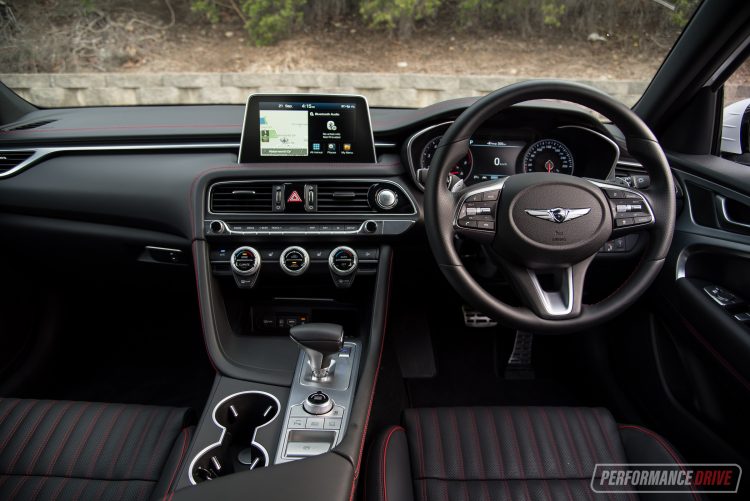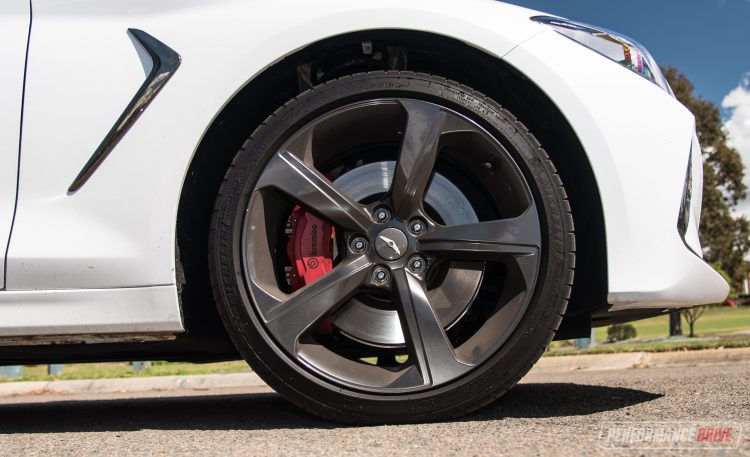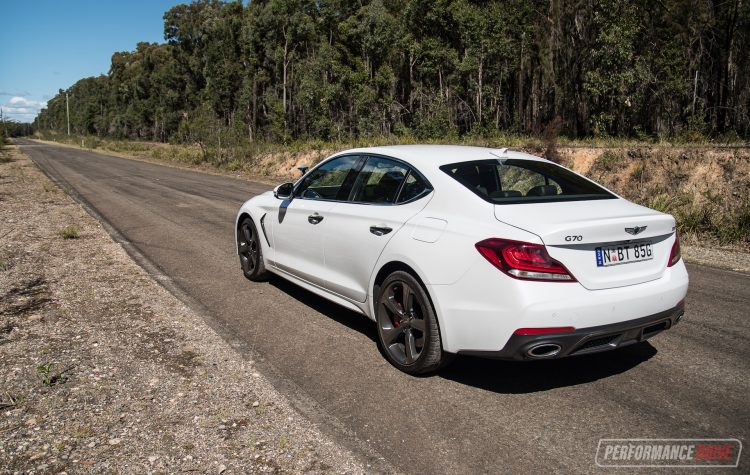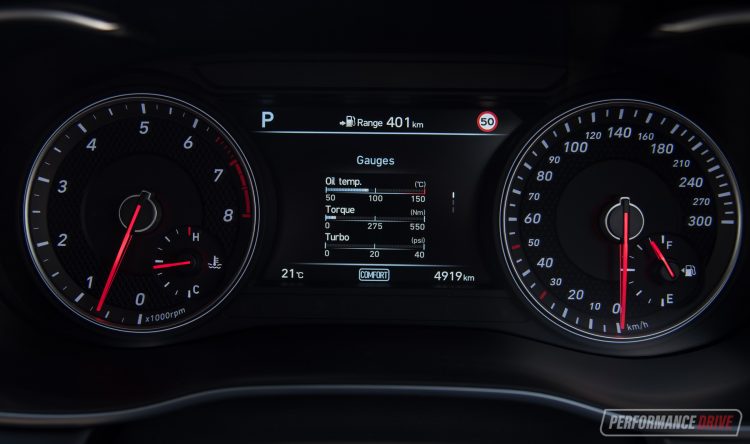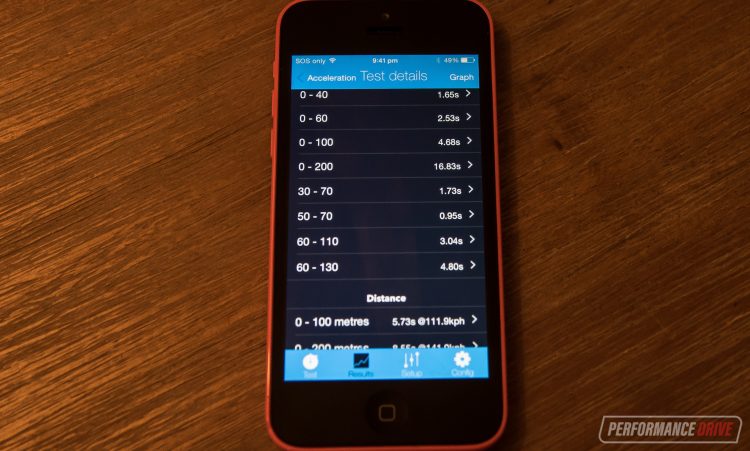We enjoyed our time with the new Genesis G70 during the official launch earlier this year. So much that we thought it might be a good idea to review one over a longer term than usual to learn more about this subtle performance sedan.
So here it is. It’s a sparkling Casablanca white 3.3T Sport, which is the entry level of the twin-turbo V6 range. This is a good thing as it is arguably the purest and most driver-focused version, doing without some of the weighty luxuries of the flagship Ultimate variant. As with all G70 models available in Australia, this is rear-wheel drive and comes with an eight-speed auto.
For this review we’re spending one month with the car and we’ll create a four-part review for each of the weeks. However, as you’ll find out in Part 3, our time was unfortunately cut short due to another motorist seemingly not knowing how to use his eyes or steering wheel during driving, resulting in some carnage to the poor G70 – and while we were parked! More on that in a week or so.
This introduction is going to focus mainly on the performance and handling of the car, including our full acceleration and braking tests, and video. In Part 2 Mark will cover what the G70 is like to live with in terms of a daily driver, and go over its features. And then in Part 3 Alexi will round it out and go over what went down during the annoying incident.
Handling
Yes, the G70 is based on the same platform that underpins the Kia Stinger. However, the wheelbase is 70mm shorter, which helps to increase agility. With less metal in the middle, the G70 is also lighter. According to the Redbook specs it’s 55kg lighter (1725kg vs 1780kg). We notice the tare weight is listed at 1725kg across all G70 3.3T versions. We doubt this is the case in reality as the high-end models come with extras that surely weigh it down more; electric sunroof, heated rear seats, electric steering column.
The Stinger is already a great handling vehicle. But in our opinion the G70 takes it to the next level. Enough to take on the established greats from Europe? We honestly think so. Genesis has fit the Sport with 225 front and 255 rear Michelin Pilot Sport 4 tyres, which provide enormous grip, and there’s a standard limited-slip differential to sort out any potential traction issues before they occur.
Flogging into a set of bends, the G70 Sport soaks up road surface imperfections with very little aftershock entering the cabin or disturbing the stability or wheel tracking. Then it’s just a matter of leaning on the standard Brembo brakes to wipe off some speed before hooking the three-spoke sports steering wheel into the corner.
It feels precise and neutral under moderate throttle during cornering, pulling decent g-force in the process. And with that limited-slip diff you’re able to get back on the power as soon as you clip the apex, or even just before it if you’re feeling frisky.
Switch the stability control off and you’ll find even then, the rear end won’t immediately snap out sideways, like the engine outputs would suggest. Instead, if you want to take part in sideways antics you need to wrestle with the wheel a bit and use some momentum, or give the throttle a sharp stab just before the middle of the corner. It’ll swing out, and it’s easy to catch.
Overall, the near-the-limit handling and cross country capability isn’t quite at 3 Series levels in my personal opinion. But it isn’t far behind at all. It’s certainly ahead of the Lexus IS and Infiniti Q50. Especially in this twin-turbo configuration.
Performance
We did some performance testing with the Vbox Sport during the official launch event for the G70 earlier this year. But it was on a public road and we had limited time to really try out the different driving modes and experiment with different launch methods. On our usual private road, we ran the car about 10 times to find out what it could really do.
Our best 0-100km/h was a super-impressive 4.68 seconds. This is pretty much on par with Genesis’s claim of 4.7 seconds. It achieved this by building the engine revs on the brake pedal and letting the launch control system manage any wheelspin (stability control needs to be fully deactivated before ‘launch control’ engages). This was leaving it in D for the transmission to decide what ratio it needs as well.
Traction doesn’t seem to be a major issue getting off the line. Even without using the launch control method the car gets off the line with relatively little fuss. And actually, the only time the rear wheels broke traction was when we simply nailed the throttle without first building the revs on the brake (we did this in the video for you, see below). This is probably due to the turbochargers spooling as you leave off the line, and then the full boost pressure comes in as a sudden whack – as opposed to spooling them up on the brake before setting off.
Across the quarter mile our best result was 13.08 seconds at 178.5km/h, just missing out on the 12-second zone. With some very light tuning or even after some kilometres on the clock to fully run the engine in, it could probably dip into 12s with no issue. We also clocked a best 0-200km/h of 16.83 seconds. This, in particular, gives you some idea of the relentless top-end power of this engine.
The 3.3-litre twin-turbo V6 hits its peak 272kW at 6000rpm. And the peak torque of 510Nm is spread wide from just 1300rpm and held until 4500rpm. If you take a look at some of the competitors, these figures and the respective rev ranges are right up there with the best of them. For example, the last Jaguar XE S (3.0L supercharged V6) produced its 280kW at 6500rpm, but its peak torque of 450Nm was available between a narrower 3500-5000rpm.
The G70 3.3T Sport is affordable (for this class), seems very well made, looks cool and distinctive, and, as it turns out, offers exceptional performance for this class.
After our first week the only slight disappointments for us were the smallish touch-screen, and the quietness of the engine and exhaust. But, in saying that latter point, this isn’t setting out to be a sports car or even a motorsport-inspired performance model. It’s simply a mid-size executive sedan equipped with a very powerful engine. In that regard, it could be appreciated as a sleeper.
Another minor complaint we have is the gearbox. There is no defined manual mode, so it will change up if you don’t. But not only that, it is delayed at times and seems confused during heated driving. If you take a look in our video below you’ll see during 60-110km/h the kickdown is rather slow – there’s a good second or 1.5 seconds of pause. Out in the mountains during a spirited drive, compound little delays like this together and your overall drive can seem disrupted and disjointed.
Stay tuned for Part 1, where, as mentioned, Mark will go into detail about the features, interior, and what the G70 is like to live with during the daily grind. In the meantime you can check out our 0-100, 0-200, 1/4 mile performance test video below.
2019 Genesis G70 3.3T Sport – THE SPECS
Engine: 3.3-litre twin-turbo V6
Output: 272kW@6000rpm / 510Nm@1300-4500rpm
Transmission: Eight-speed auto
Drive type: Rear-wheel drive, limited-slip diff
Wheels: F: 19×8.0, 225/40 R: 19×8.5, 255/35
Tare weight: 1725kg
Power-to-weight: 6.34:1 (kg:kW)
0-60km/h: 2.53 seconds*
0-100km/h: 4.68 seconds*
0-200km/h: 16.83*
60-110km/h: 3.04 seconds*
1/8 mile: 8.58 seconds at 142.3km/h*
1/4 mile: 13.08 seconds at 178.5km/h*
Max acceleration: 1.014g*
100-0km/h braking: 2.86 seconds at 36.97 metres*
Max deceleration: -1.409g*
Decibel at idle: 40*
Peak decibel at 60-100km/h: 83*
Priced from: $72,450
* Figures as tested by PerformanceDrive on the day. Factory claims may be different

